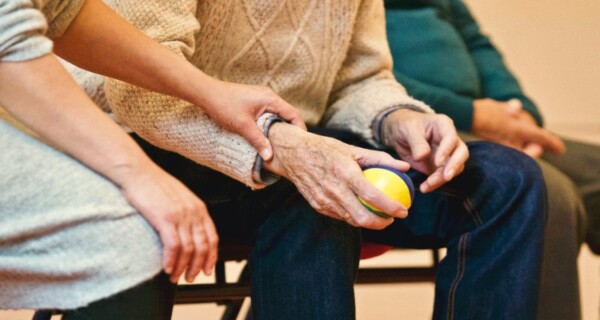In palliative care, where people are often found fighting terminal illnesses in the last stages of their lives, one medicine triumphs all: love. In this article, cancer research associate Dr. Joyeeta Talukdar (Ph.D. in Cancer Biology) who works in AIIMS and is associated with palliative care of cancer patients and has worked in the Covid-19 Sentinel projects of the Assam Government, recalls the most heart-warming stories of love and endearment that she’s had the pleasure of witnessing.
What Is Palliative Care?
Palliative care involves a holistic approach toward taking care of a patient who is in the final stages of terminal diseases like cancer. With the help of symptom treatments, counseling, medication facilities, doctors on board, and consultancies, we make sure we do all we can to make life as comfortable as possible for patients. During my time in palliative care, I’ve come across a few truly remarkable cases that personify the importance of love in our lives. Let’s take a look at a couple of them.
When Oral Cancer Couldn’t Stand Between Love
When I came to AIIMS for the first time, I met Virendra and Jyoti*. Jyoti was a few years older than him, which was a little unusual, especially in an old-school arranged marriage like theirs. Virendra was about 75 when I first met him, and he was suffering from oral cancer. After my first interaction with him, I could see he wasn’t doing too well. I had dealt with a similar case back in Assam. Though that person was in a much better state, she was not able to survive because she lacked the strength and the willpower to. From immunotherapy to other palliative therapies, medicines, and symptom curbing, Virendra was going through it all to try and survive, though none seemed to work too well. His son was working abroad and his daughter and son-in-law lived close by. As I got to know this delightful human being more, I realized that his tenacity and sheer grit kept him going, despite every day looking like more of a struggle than the last. Even with his illness affecting every aspect of his life, he’d often cook for us and for his wife, to try and take care of her. His determination to at least appear to be better is still something we can never forget. One fine day, I asked him, “Why do you want to survive? How do you find the willpower?” “My son has a family. My daughter has a family. To my wife, I am her family. We have been staying together in solidarity since the last 15 years since my son went abroad and my daughter got married. By now, we’re used to taking care of each other.” “Forget love, this is compassion and support. She used to work for the government, and I worked for a private firm. If I was relying on my pension for my treatment, I wouldn’t even have survived the first stage of cancer. I’m only here because Jyoti wants me to survive. And because I see Jyoti wants me to survive, I want to survive.” Our team of doctors was amazed to see him pull through with immunotherapy for five to six years. In all essence of the word, it was truly miraculous to see him fight every day. What made it even more special was that it was all to make sure his wife still had family. He’d get anxious when he heard Jyoti wasn’t doing so well. He’d talk to her, tell her to not worry, and tell her she was going to be okay. The last time he went to the hospital, he said to his wife, “I’ll come back. Don’t worry about me, Jyoti. We’ll share a cup of tea. I’ll make you your favorite dish.” The complications grew and his health deteriorated. He left us last year, but we’re not going to forget the willpower he brought with him to survive. I still follow up with his wife. She appears to be doing pretty well, but she’s not ready to leave the home she rented with Virendra, though they have a house they own. “Everything here bears his memory, I can’t get myself to leave this place,” she tells me.
Saying Goodbye To A Love That Lasted A Quarter Shy Of A Century
Back in Assam, there was a couple I was really close to. Vikram* was my father’s colleague, whose marriage with Chitra* must’ve lasted around 70 years — if my memory serves me right. It seemed as though they were in love since forever. Vikram spent his life working as a radiologist, which unfortunately resulted in him developing prostate cancer. Despite how bad and sickly Vikram got, I could always see a deep adoration for his wife within him. I saw how he wanted to survive, just so Chitra wouldn’t break down. When Vikram was in palliative care, we’d often take him to visit Chitra. Every time we went over, Chitra would barely be able to sit down, restlessly hurrying around, as if her soul wouldn’t let her take a look at the state Vikram was in. In private, I asked her, “Aunty, why do you leave the room so much whenever Vikram is here?” She replied, “Every time I see him like this, I just can’t hold the tears back. But, I don’t want him to see how weak I am, so I leave the room and burst into tears. I cannot be weak in front of him.” She spent the better part of a century with Vikram, and seeing him deteriorate wasn’t something she thought she could bear, at least not in front of him. One day, we were all sitting in the same room talking, and Chitra was being her usual hasty self. Vikram wasn’t feeling particularly well that day. He was bedridden. As soon as he saw Chitra walk into the room to give him some food, he got up, walked up to her, and hugged her as tight as he could. “You need to cry, Chitra,” he said. “You need to let it go. I won’t physically be here all the time, but my soul will always be with you.” Upon hearing that, Chitra wasn’t the only one who started crying. In fact, there was not a single person in the room who didn’t shed a few tears. She found it very difficult to cope with his passing. She fills her day by taking care of her home, which she’s not ready to leave. The memories are too dear to her to let go of, and her son can’t persuade her to come and live elsewhere.
The Caretaker’s Dilemma
The patients in palliative care suffer from their illnesses. But the caretakers, whose lives revolve around taking care of the patient, go through psychological damage of their own. They go through trauma every day. They take care of the patient, the food, and the medicine schedule. We’ve seen many, many caretakers go through depression, which lingers on even after their loved one’s passing. Caretakers become so programmed to take care of the person they love, it becomes devastating when they don’t have to do that anymore. At first, it may be a sort of relief when the suffering patient has been put to rest, but eventually, they’ll find they now have a big part of their life that they must now part ways with. That realization only sets in when you acknowledge what has happened, which may be too painful for some. At that stage, finding a new purpose in their lives becomes extremely difficult. In palliative care, we take care of the caretakers as well. They cannot be left out after the patient has passed away. The memories they shared with the person, the routines they had grown so used to, and the difficulty in accepting what has happened can all take their toll on someone. We regularly check in on caretakers to make sure they’re doing well. It becomes the caretaker’s purpose to make sure the person who is suffering is getting all they can. Despite their best efforts, they see their health deteriorating. And when they pass away, there’s always a void, there’s always pain. Unless the caretakers fill that void, dealing with the depression that comes with it is almost impossible. Being around such patients teaches you that love may truly be the thing that matters most in life. When you pledge to be with someone, you’re with them till the end — in sickness and in health. If this article has got you believing in love again and feeling bad for the people who must part ways with their lovers, give someone in palliative care a visit — they’ll cherish it. *Names changed to protect identity


